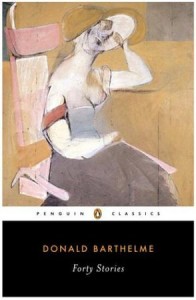 Donald Barthelme is perhaps one of America’s most influential unread authors. He is not often canonized in “best of” lists, rarely named as someone’s favorite writer, and yet his influence over fiction in America is undeniable. His short stories have found greater success than his longer works, with two volumes, Forty Stories and Sixty Stories, encompassing most of the former output. These are marked by an astonishing compactness: in a few brief pages he manages to create a world, draw you in, force you to take interest in his characters and then, as surely as the magic has been wrought and you find yourself immersed, a page is turned and there’s an end – you’ve been had, teased, and as surely as you entered the first story you will enter the next, committing yourself to what you know will end. In this he is deserving of comparison with Borges: both give synopses of larger works, the tantalizing promise of more to come.
Donald Barthelme is perhaps one of America’s most influential unread authors. He is not often canonized in “best of” lists, rarely named as someone’s favorite writer, and yet his influence over fiction in America is undeniable. His short stories have found greater success than his longer works, with two volumes, Forty Stories and Sixty Stories, encompassing most of the former output. These are marked by an astonishing compactness: in a few brief pages he manages to create a world, draw you in, force you to take interest in his characters and then, as surely as the magic has been wrought and you find yourself immersed, a page is turned and there’s an end – you’ve been had, teased, and as surely as you entered the first story you will enter the next, committing yourself to what you know will end. In this he is deserving of comparison with Borges: both give synopses of larger works, the tantalizing promise of more to come.
Barthelme is also playful, to the consternation of many of his critics. Narrative and character are subordinated to verbal and formal dexterity: he cares less about the story he is telling than how he is telling it, and he includes all kinds of sketches, drawings and photographs within the body of his stories that break our concentration and force us to regard the story as it is constructed, a sort of authorial wink or in-joke letting us know that he knows that we know that these are still just words on a page rather than real life unfolding before us. David Gates, charged with writing the introduction to Sixty Stories, puts it like this:
Obviously Barthelme’s idea of a story subverts the still-standard Chekhovian template: modest deeds of modest people leading up to a modest epiphany. He wickedly characterized such pieces in a ready-to-rumble 1964 essay as “constructed mousetrap-like to supply, at the finish, a tiny insight insight typically having to do with innocence violated.” […] he seems to savor conventional narrative for its quaintness rather than for any possibility that we might drift slackjawed into a state of suspended disbelief.
And the actual form of these forty stories speaks to this: there are essays, traditional narratives, monologues, question and answer sessions, and hybrid forms that draw on two or more of the above. Nor are the pieces limited in any way by a desire for realism: pirate ships, tyrannical kings and mythical woodland creatures all make appearances.
But for all his formal radicalism, the stories that work best are still those with the traditional aims he parodies as “mousetraps,” and his subject matter – love, sex, death, purpose, marriage, etc. – would not seem so foreign to Chekhov. The experiments with form are simply his way of testing the limits, a groping-in-the-dark after the potential of dialogue or exposition without embellishment. Most writers’ experimenting ends up in a trash can or as ashes in a fireplace, but most writers are not Donald Barthelme.